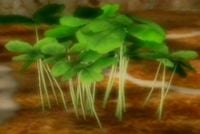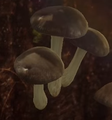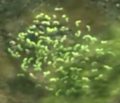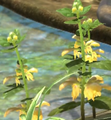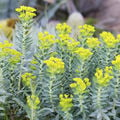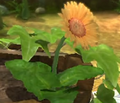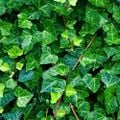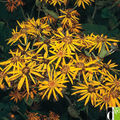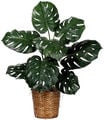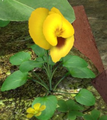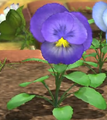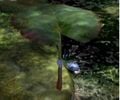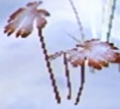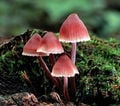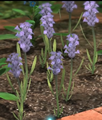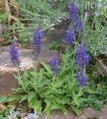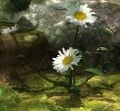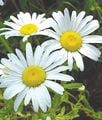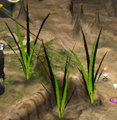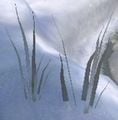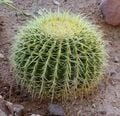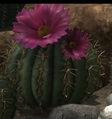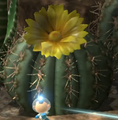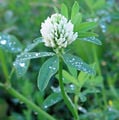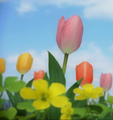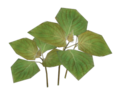Vegetation
- "Flower" redirects here. For the flower atop a Pikmin's head, see Chaenostoma cordatum and maturity.
- This article is about vegetation in the canon games. For vegetation in Pikmin Adventure, see Pikmin Adventure vegetation.
PNF-404 is covered in all sorts of vegetation in addition to its animal wildlife. This includes an assortment of plants and fungi. Gameplay-wise, these can either be static background or area geometry elements, or they can be game objects that react to the world around them. For the most part, plants and fungi serve only an aesthetic purpose, but in some instances, they can directly contribute to the gameplay. With the Piklopedia in Pikmin 2, some plants and fungi were given a bit of importance inside the game itself, but because the explorers are not specialists in plant and fungus lifeforms familiar to humans, they mistakingly categorize things like LED lights as plants. In addition, Captain Olimar refers to Pikmin as being "both plant and animal".[1]
Vegetation as game objects
As stated above, some forms of vegetation are game objects, much like the leaders or the Pikmin. They are dotted about the terrain, and most of them have minimal impact on the gameplay, serving only for decoration; at most, they gently sway when brushed against. However, while some plants and fungi may be decorative in and of themselves, upon touching them they may release some helpful enemies hiding within, like Unmarked Spectralids, Honeywisps or Iridescent Flint Beetles. Others can also act as hiding spots from predators. Finally, there is a small handful of plant and fungus objects that have an important role as a gameplay mechanic.
Vegetation as terrain
The terrain in PNF-404 consists of all sorts of surfaces. Given the series' highlights of nature, a large part of the terrain Pikmin and leaders walk on is made up of flora or fungi. This can range from grass to tree trunks. These different terrains count simply for decoration, as they have no impact on the gameplay, other than providing different footstep sounds when leaders walk on top of them.
Vegetation as background
In order to give the areas some physical context, the out of bounds sections of the terrain are filled with plants and fungi. At times, it is even in much larger amounts than what can be found in the area's in-bound terrain; the reason for this is to stop the gameplay section of the area to be too cluttered. The outside of maps can consist of normal vegetation gameplay objects, dedicated models (e.g. trees, leaves, or unique flowers), or, in the case of the first two games, a wall with a texture of assorted vegetation, like mossy stones or trees.
List of identified vegetation
The following is a list of identified plants and fungi in the Pikmin games. This list refers to vegetation that is given an actual name or recognition inside the games, but also vegetation that has a mechanic in the game, and not just aesthetics. Only Pikmin 2 actually names most of these, with the Piklopedia. You may also browse the categories available on Pikipedia, with the top one being Vegetation.
Pikmin 2
 Burgeoning Spiderwort
Burgeoning Spiderwort Clover
Clover Common Glowcap
Common Glowcap Creeping Chrysanthemum
Creeping Chrysanthemum Crimson Candypop Bud
Crimson Candypop Bud Dandelion
Dandelion Fiddlehead
Fiddlehead Figwort
Figwort Foxtail
Foxtail Glowstem
Glowstem Golden Candypop Bud
Golden Candypop Bud Horsetail
Horsetail Ivory Candypop Bud
Ivory Candypop Bud Lapis Lazuli Candypop Bud
Lapis Lazuli Candypop Bud Margaret
Margaret Nectar weed (conjectural name)
Nectar weed (conjectural name) Pellet Posy
Pellet Posy Queen Candypop Bud
Queen Candypop Bud Seeding Dandelion
Seeding Dandelion Shoot
Shoot Violet Candypop Bud
Violet Candypop Bud
- See also: [[::Category:Pikmin 2 vegetation|Pikmin 2 vegetation category]].
Pikmin 3
 Bloominous Stemple
Bloominous Stemple Bouncy Mushroom
Bouncy Mushroom- [icon] Burgeoning Spiderwort
 Clover
Clover Common Glowcap
Common Glowcap Crimson Candypop Bud
Crimson Candypop Bud Dandelion
Dandelion Figwort
Figwort Flukeweed
Flukeweed Golden Candypop Bud
Golden Candypop Bud- [icon] Gray Candypop Bud (conjectural name)
 Ivory Candypop Bud (Mission and Bingo Battle)
Ivory Candypop Bud (Mission and Bingo Battle) Kingcap
Kingcap Lapis Lazuli Candypop Bud
Lapis Lazuli Candypop Bud Lily pad
Lily pad Pellet Posy
Pellet Posy- [icon] Pink Candypop Bud (conjectural name)
 Seeding Dandelion
Seeding Dandelion Shoot
Shoot Spotcap
Spotcap Violet Candypop Bud (Mission and Bingo Battle)
Violet Candypop Bud (Mission and Bingo Battle)
- See also: [[::Category:Pikmin 3 vegetation|Pikmin 3 vegetation category]].
Hey! Pikmin
|
The following article or section is in need of assistance from someone who plays Hey! Pikmin. |
 Bloominous Stemple
Bloominous Stemple Bouncy Mushroom
Bouncy Mushroom Clover
Clover Electric mushroom (conjectural name)
Electric mushroom (conjectural name) Hydroe bramble (conjectural name)
Hydroe bramble (conjectural name) Leaf platform (conjectural name)
Leaf platform (conjectural name) Seeding Dandelion
Seeding Dandelion Springpetal
Springpetal Vine (conjectural name)
Vine (conjectural name)
Pikmin Adventure
Plants and fungi in Pikmin Adventure are once again decorative and hardly interactive, but there are Nintendo Land Plaza statues for each of them. These are unlocked using Nintendo Land Coins.
List of unidentified vegetation
|
This article is a stub. You can help Pikipedia by expanding it. |
There are forms of vegetation that are not given a name or any sort of importance inside the games themselves. However, their species can still be known by examining how they look and act, compared to plants and fungi in the real world. Some vegetation, however, cannot be identified at all, either because they do not resemble any real world plant, or because the resemblances are too weak to reach conclusive proof. The names given on this list are the real world names.
Brown mushrooms
Brown mushrooms appear in Pikmin 3, and they grow on trees. This type of mushroom must not be confused with another brown mushroom that can only be found on the ground. Unlike the latter, it's not possible to interact with it.
Common poppy
There is a red flower in Pikmin 3 which resembles a common poppy.
Creeping burhead
These flowers appear in the Garden of Hope in Pikmin 3.
Duckweed
Duckweed is a plant that grows in the ponds and lakes of the Garden of Hope in Pikmin 3.
Eaten leaves
In the background of Tropical Wilds in Pikmin 3, it's possible to see leaves that seem to have been eaten by something.
Epipremnum aureum
This tropical plant appears in Pikmin 3.
Euphorbia
Euphorbiae are flowers appearing in Pikmin 3.
Fern
Ferns are large plants which appear in Pikmin, Pikmin 2, and Pikmin 3, and more precisely, in two colors: brown or green.
- Fern 1.png
A group of green ferns in the Tropical Wilds.
- Fern 2.png
A group of brown ferns in the Twilight River.
- Ferns Pikmin 2.png
A group of brown ferns in the Wistful Wild.
- Ferns 1.png
A fern in The Impact Site.
Forget-me-not
Forget-me-nots only appear in Pikmin 3 in the Beastly Caverns stage of Mission Mode and the Shaded Terrace stage of Bingo Battle. They are popular garden flowers, only acting as decoration to the garden themes of these two areas.
French marigolds
Tagetes patula, also called French marigolds, appear in the Garden of Hope in Pikmin 3, on the room with the Astringent Clump.
- French marigolds.jpeg
Some French marigolds in the Garden of Hope.
- Real French marigold.jpeg
A real life yellow French marigold.
Fuzzy leaves
In Pikmin, and more precisely in The Impact Site, it's possible to see strange leaves. Due to the lack of details, it can't be matched with a real plant.
Gerbera
In Pikmin 3, it's possible to find flowers very similar to gerberas.
Glebionis coronaria
Glebionis coronaria, or chrysanthemum coronarium, are yellow flowers found in Pikmin 3. Although they're similar to Dandelions, they are smaller.
A glebionis coronaria in the Forgotten Cove.
Hedera Helix
Hedera helix, or common ivy, is a rampant and clinging plant often found on walls. It is possible to see this kind of plant in Pikmin 3.
- Brown ivy.jpeg
A brown common ivy in the Twilight River.
Holly
Some holly can be seen in the Distant Tundra in Pikmin 3 .
Inonotus ispidus
Inonotus ispidus is a mushroom growing on trees. It appears in Pikmin 3 in autumnal areas such as Twilight River or Twilight Hollow.
- Inonotus Ispidus.png
Three inonotus ispidus
- Inonotus-hispidus7.jpg
A real inonotus ispidus.
Ligularia clivorum
This yellow flower appears in the background of The Final Trial in Pikmin and the Garden of Hope in Pikmin 3.
- Ligularia.png
A group of ligularia clivoros in Pikmin.
- Ligularia clivorum.jpg
A group of ligularia clivoros in Pikmin 3.
Monstera Deliciosa
Also called splitleaf philodendron, this tropical plant used for interior decoration appears in Pikmin 3, and more precisely in the following areas: Tropical Wilds, Tropical Forest and Tropical Forest Remix.
Morning-glory
These flowers appear in Pikmin 3 and more precisely in the Forgotten Cove.
A pink morning-glory in the Forgotten Cove.
Pansy
Pansies are flowers which appear in Pikmin 3. Depending on the current day, their color can change.
A blue pansy as it appears in the Garden of Hope in Pikmin 3.
A yellow pansy in the Garden of Hope. Notice this pansy is located at the same place as the blue pansy.
Peltate leaf
Several large flat leaves appear in the background of the Perplexing Pool, serving no other purpose than decoration. The leaves' stems connect at the bottom, characteristic mainly to tropical plants. Its species name would probably be peltata.
A peltate leaf seen in the Perplexing Pool.
- RealLifePeltateLeaf.JPG
A real-life peltate leaf, from merremia peltata.
Pine needle
Although it is not confirmed, there are needles in Pikmin 3 which seem to be pine needles.
A group of needles in the Distant Tundra in Pikmin 3.
Plant with pink flowers
In Pikmin 3, there is an unknown plant that can be found in The Rustyard. It has little pink flowers with clearly visible brown roots, and leaves.
Red mushroom/leaf
|
This article or section needs to be cleaned up, either its format or general style. |
There is an unknown red object that appears in all Pikmin games. It is either a red-leafed plant or a red mushroom. It is quite common in Pikmin, appearing in every area. In Pikmin 2, this same red-leafed plant only appears in the Valley of Repose near the landing area, covered in snow. In Pikmin 3 the plant becomes a trio of mushrooms found only in the Tropical Wilds and the Formidable Oak; they make a unique sound when disturbed. The red-leafed plant from Pikmin and Pikmin 2 could be based on heuchera micrantha whereas the new mushroom's look could be based on mycena haematopus. In Pikmin 2, they belong to the area's geometry, but in Pikmin, it is its own object, called chidome, which could be short for チドメグサ属?. That is the name given to the Hydrocotyle genus (also known as "water pennyworts"), which are plants with long stems that live near water.
Salvia nemorosa
This plant is made of little purple flowers. They can be seen in Pikmin 3.
Seaweed-like plant
In Pikmin, there is an unknown plant that can be found in The Distant Spring, and more precisely in the water. It is supposed to be some sort of seaweed.
Shasta daisy
The shasta daisies only appear in Pikmin 3. They only act as decoration, though a White Spectralid will normally land on a group near the landing site in the Garden of Hope.
Spiked grass
Spiked grass appears in grouped tufts in Pikmin, as decoration for The Forest Navel's landing site. They also appear in Pikmin 2 and Pikmin 3 on the Twilight River.
Some spiked grass in the Valley of Repose.
Sprout
Ambiguous two-leafed sprouts appear in patches in Pikmin 3, acting as hiding spots. The Distant Tundra also features patches of brown dried sprouts.
An image of some sprouts located in the Tropical Wilds.
Succulent
The Formidable Oak in Pikmin 3 features numerous different variants of cacti and succulent plants. These include haworthia attenuata, stout barrel cacti, aeonium succulents, and large columnar cacti in the distance. The Formidable Oak also houses some more ambiguous but unique flora, including inflorescences of pink wildflowers, sprouts and tufts of dry grasses, and even some tiny lichens in the center of the arena area. Most of these succulents and some of the flower types are also used in the Thirsty Desert and its remix in Mission Mode.
- Formidableoak.jpg
A view showing most of the flora in the Formidable Oak.
- Haworthia.JPG
Real-life haworthia attenutata.
- DesertAeonium.JPG
A real-life example of spiky aeonium succulents in the desert.
Tree
|
This article or section is in need of more images. |
Nearly every area of every game (excluding The Forest Navel) contains trees, though most of the time they go unnoticed. Their main effect on gameplay is providing dynamic shadows that make the look of the environment more realistic and interesting. Trees can be seen in most of the backgrounds of the first two games' areas, but the textures depicting them are simple and looped, and often obscured by distance fog. In Pikmin 3, the entire skybox is rendered, and one can see full trees surrounding the area using the KopPad's camera.
The seamless texture for trees in the Valley of Repose.
The background of the Wistful Wild.
Tall oaks in the background of the Garden of Hope.
More tropical trees in the background of the Tropical Wilds.
Trees in the background of the Twilight River.
- Formidableoakbackground.jpg
Acacia-like trees in the background of the Formidable Oak.
Trees in the background of the Distant Tundra.
Trifolium alexandrinum
A trifolium alexandrinum (also known as Egyptian clover) is a plant used as a fodder. It appears in Pikmin 3. This is actually a flower of a Clover. In Pikmin 3, this flower may appear or not, depending on the current day.
Tulip
These only appear in Pikmin 3, and with different colors from normal (such as pink or yellow).
A screenshot from the credits of Pikmin 3 showing different tulips.
Clinopodium gracile
トウバナ (Clinopodium gracile) is made of several little leaves. It appears in the following areas:
- Layout A of the Blooming Terrace
- Twilight River
- Twilight River Remix
- Formidable Oak Remix
- Tropical Forest Remix
- The Rustyard.
Vine
An ivy-like vine appears in the Tropical Forest in Pikmin 3, creeping along the edge of a raised platform and wall until twirling into a curled slide. Leaders and Pikmin can slide down this vine to get from the raised platform to the lower ground quickly, but not vice versa. Several vines are also used for scenery.
Weed
A prototype of Pikmin 3 contained an unused patch of weed-like plants.
White mushroom
In Pikmin 3, it's possible to find a white mushroom in autumnal areas.
The white mushroom in the Twilight Hollow.
Yellow wood sorrel
Yellow wood sorrels only appear in Pikmin 3. They only act as decoration, though one patch near the landing site in the Garden of Hope hides an Iridescent Flint Beetle.
- Flinty.jpg
An Iridescent Flint Beetle running out of some yellow wood sorrel.
See also
References
- ^ “What exactly are these Pikmin? One could classify them as both plant and animal.” – Captain Olimar in his voyage log
